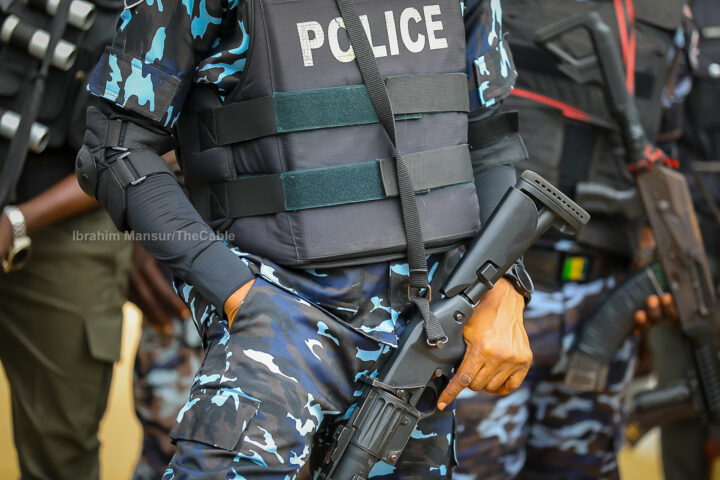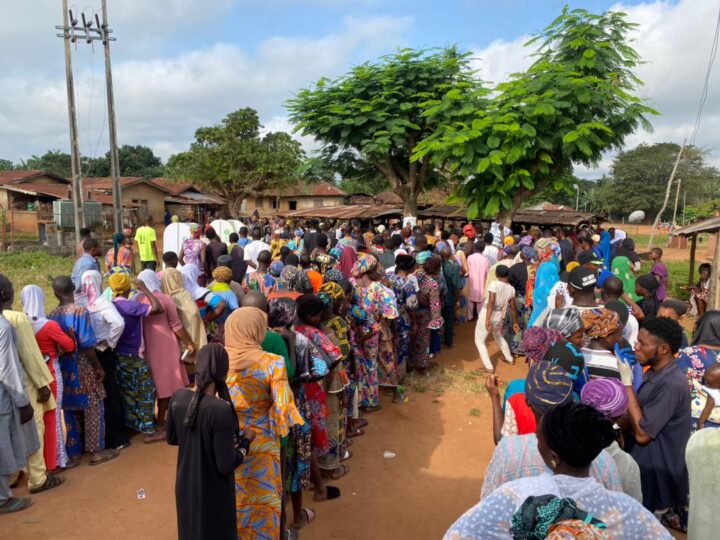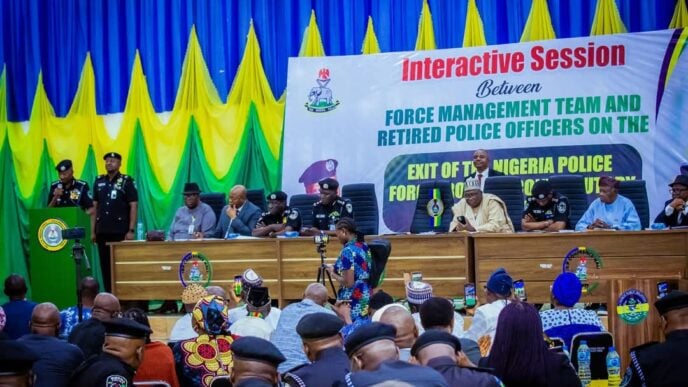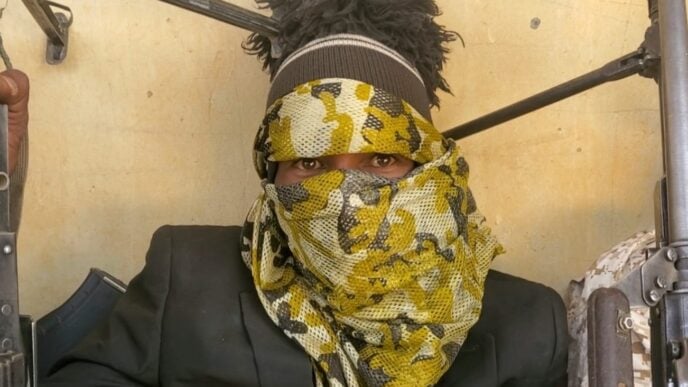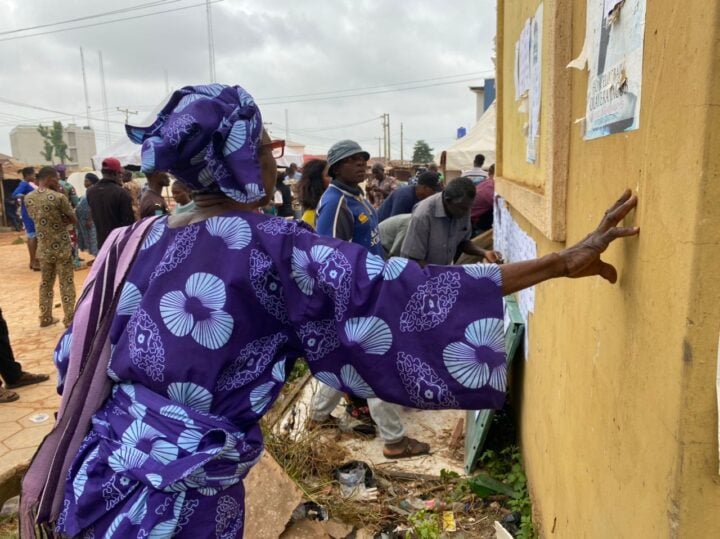Police officers | File photo
BY HOPE LEKWA
In the past decade, the Nigeria Police Force (NPF) has faced an uphill battle trying to maintain peace in a country grappling with rising internal conflicts. Despite some operational successes, the effectiveness of the force has been weakened by a mix of long-standing challenges such as inadequacy in personnel and resources, corruption, and an overly centralised command structure.
These issues have delayed response time and left many communities unprotected and frustrated. Meanwhile, some officers remain attached to VIP security assignments, even after the inspector-general’s directive for their recall. In the absence of substantive police presence on the streets, violent clashes and criminal activities continue to escalate.
Nowhere has Nigeria’s fragile security architecture been more evident than in the recurring terrorist onslaughts witnessed in Benue, Taraba, Plateau, and other northern states, a violence that is now gradually creeping into southern regions.
A Complex Crisis
Advertisement
The surge in violence, especially with those linked to herdsmen attacks since 2018, demands closer scrutiny. Why are these clashes intensifying and spreading to new communities each year? Why do security forces seem to always arrive a step too late?
Three key factors help explain this crisis.
First is the competition over increasingly scarce land and water resources, worsened by climate change, population growth, and the shifting migration patterns of nomadic groups. As fertile lands dry up, the conflict between predominantly Fulani herders and farming communities has intensified. With ethnic and religious tensions often aggravating these disputes, making resolution even harder. The recent deadly clashes in Benue and Plateau states underscore this trend. It’s now clear that climate change and violent conflicts are inseparable — one directly intensifies the other.
Advertisement
Second is the short-sightedness of government interventions and the persistent failure of enforcement. Despite the creation of the Federal Ministry of Livestock Development and the formation of specialised security units, these measures have failed to stop the attacks or regulate the movement of livestock, which remains a major trigger of conflict. Since 2010, more than 15,000 deaths have been linked to farmer-herder violence. Alarmingly, about half of these fatalities occurred after 2018, with roughly 1,300 people killed in the first half of that year alone — a toll nearly six times higher than Boko Haram’s in the same period.
Third is the proliferation of firearms, which has turned many local disputes into full-blown massacres. A 2023 Research Gate publication on terrorism and arms proliferation in Sub-Saharan Africa noted a rise in the availability of small arms and light weapons (SALW) since 1999. One major factor for this is the existence of over 1,400 illegal routes into Nigeria, which serve as entry points for smuggled arms and contraband. This prompted Nigeria’s Chief of Defence Staff, General Christopher Musa, to push for the complete fencing of Nigeria’s borders with its neighbours.
Rethinking the Security Architecture
The scale and frequency of these attacks expose critical weaknesses in Nigeria’s centralised policing model. The current system has struggled to address localised violence, especially in areas vulnerable to communal clashes, banditry, and terrorism. According to a report by TheCable, Nigeria’s police-to-citizen ratio stands at 1:650 — far below the United Nations-recommended 1:450, leaving communities vulnerable and overwhelmed.
Advertisement
This imbalance has led to growing consensus among security experts, civil society organisations, and state governors that a decentralised policing model may offer a more effective and timely response. Following the recent massacre in Benue, where over 200 persons were reportedly killed, Governor Hyacinth Alia reaffirmed his call for state police as a sustainable solution to the persistent insecurity in the state.
What state policing offers is a security framework tailored to local realities. It promises faster response times, improved intelligence gathering, and community-level accountability. State-level police forces would be more familiar with the terrain, the people, and the nuances of the conflicts they’re expected to address.
A Model for Coordination, Not Fragmentation
The proposed state police system does not aim to dismantle the NPF. Rather, it seeks to complement it. Under the envisioned model, state police forces would operate under strong oversight mechanisms, including independent State Police Service Commissions to prevent abuse and promote professionalism.
Advertisement
Importantly, these state units would collaborate closely with the federal police and other agencies. State commissioners would report to their governors on local security concerns while remaining under federal oversight to ensure consistent standards and accountability nationwide. This approach strengthens national security by empowering policing at the state level, rather than creating fragmented or uncoordinated law enforcement.
While the NPF retains control over national threats such as terrorism, cybercrime, and transnational offences. State police, on the other hand, would focus on localised concerns such as armed robbery, communal clashes, traffic management, and intelligence gathering at the grassroots level. This delineation of roles would eliminate duplication and improve efficiency.
Advertisement
But Can States Afford It?
Implementing a state policing model comes with significant financial implications. Recruiting, training, and equipping a new police force will stretch state budgets that are already under pressure. Some states may lack the capacity to fund such a project without compromising other critical services.
Advertisement
To address this, a joint funding arrangement between the federal and state governments must be considered. States should also explore innovative financing through public-private partnerships and leverage new sources of internally generated revenue. What must be avoided is a situation where only the wealthier states can provide effective policing while the rest fall behind.
While calls for state policing are not new, they have become more urgent because the current system is increasingly unable to meet Nigeria’s evolving security challenges. As violent actors grow more agile and coordinated, our security institutions cannot remain rigid and reactive.
Advertisement
A decentralised police structure, properly regulated and supported, offers a chance to address Nigeria’s insecurity from the ground up, with speed, local knowledge, and tailored solutions. It is not a silver bullet. But given what is at stake, it may be the most realistic next step.
The time to act is now.
Hope Lekwa is a researcher specialising in sustainability and development.
Views expressed by contributors are strictly personal and not of TheCable.
